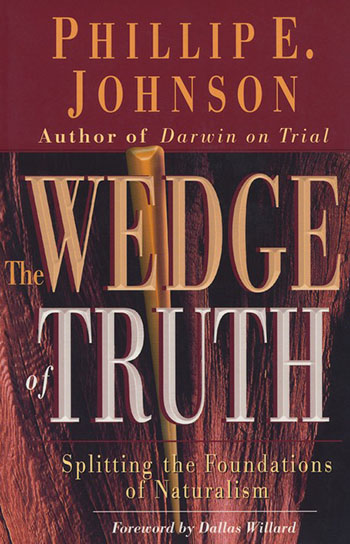by Phillip E. Johnson
192 pages / 2000
Phillip Johnson taps into his expertise as a former Supreme Court law clerk and law professor to take Darwinism before the court of logic and consistency. His book unmasks the frequent claim that Darwinism and related evolutionary philosophies are the neutral approaches to finding scientific truth, and shows instead that secular scientists are philosophically committed to naturalism - the exclusion of the possibility of any intelligence being the cause of the origin of life.
He starts his discussion of the non-neutrality of today's science by going a little further back to tell the true story of how "Philip Wentworth Goes to Harvard" and loses his faith; at least that is how secularists portray the effect of the supposedly rational search for truth in university. Wentworth's own biography shows, however, just how well primed he was to leave his faith behind before he ever got to higher education - a reality paralleled today by the students whose nominal Christian upbringing and secular education in public school means that neither they nor their parents ever really gave Christian faith a chance.
Johnson continues his argument by asking whether "...Natural Law & Chance [can] Create Genetic Information." Of course, the answer is that that has never been observed, so Darwinists use less logical methods to defend their theory, leading to Johnson's next question - "Can Science Be Defended by Authoritarian Methods" as was attempted by legal maneuvers in Kansas? Next Johnson asks, "Does Theology Provide Any Knowledge?" - a skeptical question posed not by scientists but by secular philosophers, who should know better, since skepticism about the possibility of knowledge is itself a claim of knowledge. A similar question - "Is the Thinking, Choosing Self an Illusion?" - often posed by Darwinists also undercuts scientific research itself, something made clear by C. S. Lewis as well.
Then Johnson dispenses with attacks on scientific naturalism - the assertion that scientifically observable reality is all there is - to start making the case that the universe shows the signs of intelligent design. He links the intelligent design behind creation with Christianity with his question "What If We Start with the WORD?" He ends by noting that the twentieth century has been a time of "Technological Optimism & Literary Despair" because naturalism can improve our lives in many practical ways, but it cuts us off from meaning in our increasingly wealthy and comfortable Western culture.
While there is plenty of room for discussion of how we should unite reason and faith (as in the debate between evidentialist and presuppositional apologetics), Johnson's book reminds us that reason is not the enemy of faith, and that faith (Christian or secular) is always operating whenever reason looks - or claims to look - for truth.
If you want to read this examination of the religious nature of science - both secular and Christian - and the hope offered by Christian assumptions in science, go to this link at Amazon.com.
192 pages / 2000
Phillip Johnson taps into his expertise as a former Supreme Court law clerk and law professor to take Darwinism before the court of logic and consistency. His book unmasks the frequent claim that Darwinism and related evolutionary philosophies are the neutral approaches to finding scientific truth, and shows instead that secular scientists are philosophically committed to naturalism - the exclusion of the possibility of any intelligence being the cause of the origin of life.
He starts his discussion of the non-neutrality of today's science by going a little further back to tell the true story of how "Philip Wentworth Goes to Harvard" and loses his faith; at least that is how secularists portray the effect of the supposedly rational search for truth in university. Wentworth's own biography shows, however, just how well primed he was to leave his faith behind before he ever got to higher education - a reality paralleled today by the students whose nominal Christian upbringing and secular education in public school means that neither they nor their parents ever really gave Christian faith a chance.
Johnson continues his argument by asking whether "...Natural Law & Chance [can] Create Genetic Information." Of course, the answer is that that has never been observed, so Darwinists use less logical methods to defend their theory, leading to Johnson's next question - "Can Science Be Defended by Authoritarian Methods" as was attempted by legal maneuvers in Kansas? Next Johnson asks, "Does Theology Provide Any Knowledge?" - a skeptical question posed not by scientists but by secular philosophers, who should know better, since skepticism about the possibility of knowledge is itself a claim of knowledge. A similar question - "Is the Thinking, Choosing Self an Illusion?" - often posed by Darwinists also undercuts scientific research itself, something made clear by C. S. Lewis as well.
Then Johnson dispenses with attacks on scientific naturalism - the assertion that scientifically observable reality is all there is - to start making the case that the universe shows the signs of intelligent design. He links the intelligent design behind creation with Christianity with his question "What If We Start with the WORD?" He ends by noting that the twentieth century has been a time of "Technological Optimism & Literary Despair" because naturalism can improve our lives in many practical ways, but it cuts us off from meaning in our increasingly wealthy and comfortable Western culture.
While there is plenty of room for discussion of how we should unite reason and faith (as in the debate between evidentialist and presuppositional apologetics), Johnson's book reminds us that reason is not the enemy of faith, and that faith (Christian or secular) is always operating whenever reason looks - or claims to look - for truth.
If you want to read this examination of the religious nature of science - both secular and Christian - and the hope offered by Christian assumptions in science, go to this link at Amazon.com.


No comments:
Post a Comment